The Difference of Mt.Everest in Nepal and Tibet
Due to the complicated location, the changing climate, the varied terrains, etc., there is a big difference concerning the tour experience at Mt.Everest, specifically in the south and north Everest Base Camp in Nepal and Tibet.
The Location, climate, Everest Base Camp tour, and Everest climbing route are mainly the four main aspects that we have carefully collected for you to better understand the differences of Mt. Everest in Nepal and Tibet. Now just follow our guide to make the most of your Mt.Everest tour.
Location Difference of Mt.Everest in Nepal and Tibet
It is particularly common for one mountain to share totally different locations, especially in different countries. The Everest, with its location on the border of Tibet and Nepal, is with its north face located in Tibet of China while the south face situated in the country of Nepal.
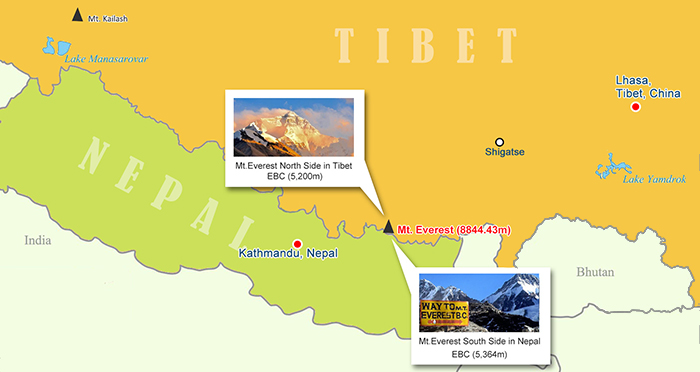 Map of Mt.Everest in Nepal and Tibet, China
Map of Mt.Everest in Nepal and Tibet, China
The importance of the geographical difference directly determines the climate, the Everest Base Camp tour, the route for Mt. Everest climbing and almost all the things appearing on both sides of the Mountain. Let’s start our exploration of the differences at both sides in Nepal and Tibet by getting acquainted with the location of the Mountain in both countries first.
Tibetan side (North Slope): The Mountain is situated in Mt. Everest National Nature Reserve, Tingri County of Shigatse City, Tibet (70% of the entire mountain is ruled by China)
Nepal side (South Slope): Mt. Everest is located in Sagarmatha National Park, Nepal (30% of the entire Mountain is ruled by Nepal)
Located at the border of China and Nepal, Mt. Everest is governed by both of the two countries’ governments. Due to the locations, the north part of the Mountain in Tibet is universally referred to the “North Slope” while the south part in Nepal is taken as the “South Slope”. Likewise, North Everest Base Camp (5200 m) in Tibet and South Everest Base Camp (5364 m) in Nepal.
Furthermore, the climbing route from the north side of the Mountain in Tibet is typically referred as the Northeast Ridge route or the Standard Route while the climbing route from the south side of the mountain is generally considered to be the Southeast Ridge route.
Climate Difference of Mt.Everest in Nepal and Tibet
Due to the location, both sides’ climates and plants of the Mt. Everest in Tibet and Nepal bare no similarities.
Tibetan side: Surprisingly changeable, unstable and difficult to predict with more fierce wind and much colder night on the mountain top. While on north Everest Base Camp, fewer plants but much clearer sky with more magnificent Everest panorama views. Shorter summit night.
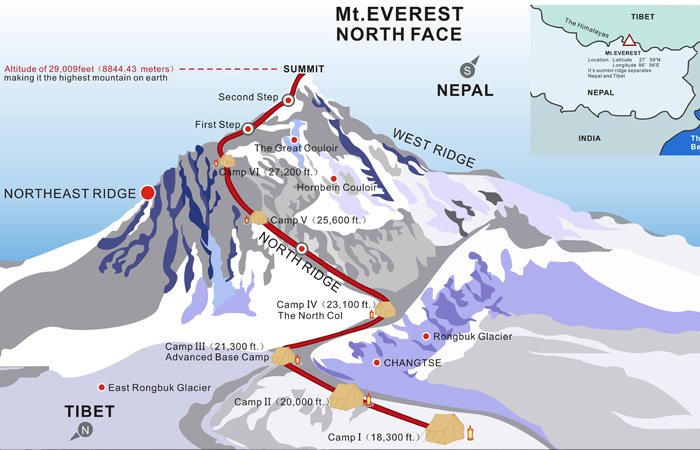 Ascend to the summit of Mt.Everest from its North Face or Northeast Ridge in Tibet
Ascend to the summit of Mt.Everest from its North Face or Northeast Ridge in Tibet
Controlled by the continental plateau climate, weather on the North Slope of the Everest in Tibet tends to be more complicated and unpredictable with drier air, dense fog at the footage but snowstorms accompanied by the relentless gale and fierce hail up on higher elevation areas.
 Mt.Everest shrouded in dense fog
Mt.Everest shrouded in dense fog
Less influenced by the ocean, lushly plants are barely found in any season of a year, what we can see are barely the alpine meadow zone, alpine desert zone with sparsely grown grass. Ice snow belts extend their ways far from the eye can see. But as compensation, much more significant Himalaya Mountains can be appreciated and more stunning panoramic mountain views can be experienced, which constantly make you stand in awe. Nepal side: Abundant rainfall, a comparatively stable climate, plant diversity, longer summit night
Affected by southwestern winds from the Indian Ocean, constant rain blurs almost all the well-known mountain pinnacles in monsoon season from June to October, making inappropriate to plan trekking to Mt.Everest. However, the humid air accompanied by a suitable growing environment makes the trek in Nepal characterized by plant diversities.
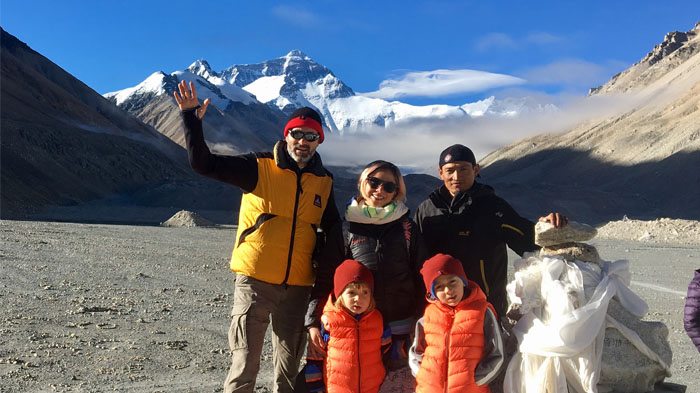
Clients took photos at EBC against the backdrop of imposing Mt.Everest.
Broad-leaved forests, needle broad-leaved forests, coniferous forests, alpine shrubland, alpine meadow zones, and ice belts can be found hierarchically from footage to the mountain top.
Insider tips:
Climates on both sides have greatly influenced the time for travelers to take the Everest tour and also determined the time to climb it.
1. In Tibet, the best time to visit Mt. Everest falls typically in Apr., May, Sept., Oct. and Nov. From Mid-June to August, the monsoon season comes and the entire Everest region in Tibet is shrouding with intermittent heavy fog and rains.
If you prefer trekking, do trek Mt. Everest from April to May and Mid-Sept. to Nov. However, for mountaineers, April to May and Sept. to Oct. are the prime time for mountaineering in Everest on Tibet’s side.
2. In Nepal, Oct. to Nov. is the best time to enjoy the EBC trek while from April to May and Oct. to Nov. are widely accepted as the best time to top the Everest. Meanwhile, climbing the south slope of Mt. Everest on Nepal’s side is less challenging.
Everest Base Camp Tour Difference in Nepal and Tibet
Northeast Ridge Camp: Take bus or trek to EBC, excellent road condition, stunning Gawula Pass, Rongbuk Monastery and more solemn Mount Everest itself.
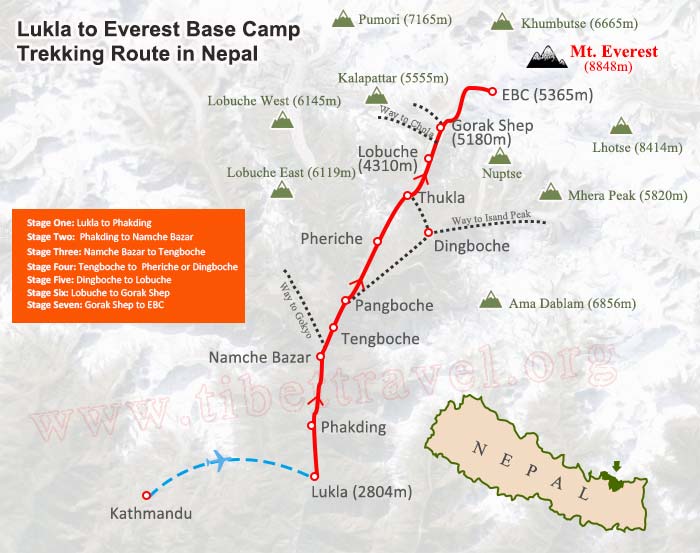 Classic trekking route from Lukla all the way to EBC in Nepal
Classic trekking route from Lukla all the way to EBC in Nepal
Highlights:
1. Awe-inspiring Gawula Pass, world-class Pass to get a fantastic panorama view of Himalaya Mountains with broad visions.
2. Rongbuk Monastery, Nearby view of solemn Mt.Everest, Stunning Everest sunrise, and sunset, Starry night on Rongbuk Monastery
3. Everest Base Camp
4. On-the-way sceneries including Yamdrok Lake, traditional Tibetan agricultural areas, Nomad’s life style, etc.
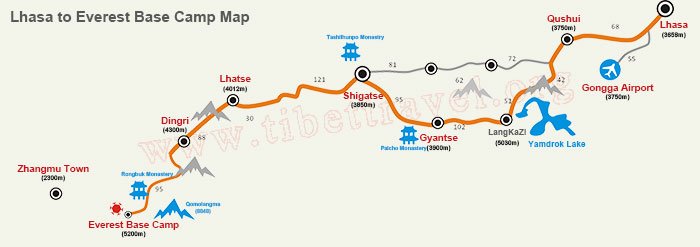 Classic travel route from Lhasa to EBC in Tibet
Classic travel route from Lhasa to EBC in Tibet
Everest Base Camp Tour from Lhasa is one of the most classic and world-class routes in Tibet. You move southwest from Lhasa and first to arrive in the historic City of Gyantse, then Shigatse, Tingri and meet the jaw-dropping Gawula Pass (5198m) from which a fantastic panorama view of Himalaya Mountains can be appreciated. Finally, you reach the Rongbuk Monastery to enjoy the starry night accompanied by the spectacular Milky Way tearing through the sky and much more solemn Mt. Everest. The Everest Base Camp is just 5 km away from Rongbuk Monastery.
Insider tips:
1. Geographically, the view of Mt. Everest on Tibet’s side is superior to Nepal’s since no visual obstruction of neighboring mountains appear around it from Rongbuk Monastery. But the top 5 soaring mountains including Makalu (8463 m), Lhotse (8516m), Mt Everest (8844.43m), Cho Oyu (8201m) and Shishapangma (8012m) can be appreciated at Gawula Pass.
2. Roads heading for Everest Base Camp are the tarmac roads with perfect road conditions.
3. The Trek from Old Tingri to Everest Base Camp can be amazing. You will be impressed by beautiful valley sceneries with extensive meadows and packs of sheep and goats. Besides, you can also meet the yak herders as well as their families.
Southeast Ridge Camp: Trek to EBC, visit legendary Sherpa village, enjoy plant diversity along the route
Highlights:
1. Reach the Everest Base Camp by trekking and enjoy the plant diversity views along the entire route
2. Appreciate Khumbu icefall from Kalapatthar that near the Base Camp
3. Visit popular places like Namche Bazaar, Tengboche Monastery and Sherpa villages.
In Nepal, trekking is the way that most visitors choose to head for the Everest Base Camp. You embark your journey from Kathmandu and take a flight directly to Lukla airport to officially begin your almost 14-day trek. - Check the classic EBC treks in Nepal.
The trek takes you through Namche and Tengpoche, Dingbuche and Lobuche and then heads towards Mt. Everest Base Camp. Along the route, you may encounter thrilling bridges, raging rivers, long uphill roads, but you are also accompanied by all kinds of plants and flowers.
The entire trek leads through the heartland of the Sherpa people, the major ethnic group native to the most mountainous regions of Nepal. Experiencing the lifestyle of this elite mountaineers can be another amazing thing along this trek. Sherpa cultures can be learned and mountain climbing skills can be acquired.
The trek eventually takes you to the last stop Gorakshep, near which there was a small mountain- the Kalapattar. From there, the most spectacular view of the Mt.Everest (8848 m) can be appreciated, along with other Himalaya Mountains including Mt. Lhotse (8516m), Mt. Ama Dablam (6812m), and Mt. Taboche (6542m) as well.
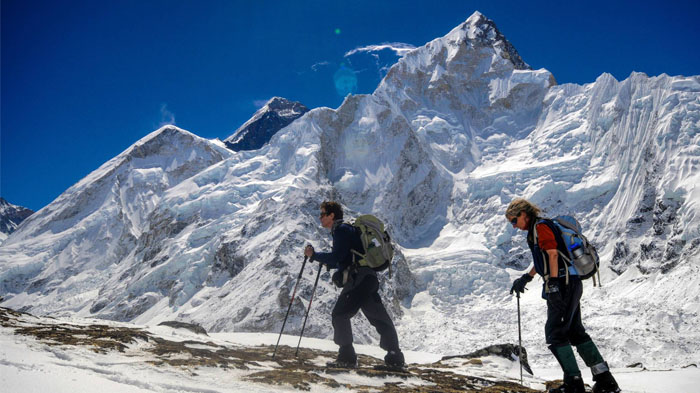
Trekking to Mt.Everest from Nepal is a popular trekking route.
But in recent years, enjoying the helicopter tour to EBC is warmly received by wealthy visitors with limited time for the EBC visit. To reach Everest Base Camp directly from Kathmandu via Kala Patthar takes only about 25mins with the two-way flight price of 1,900 US dollars per person and national park entry permit (28 US dollars/person) as well as airport tax not included.
Climbing Route Difference to Mt.Everest in Nepal and China
During the climbing season, a number of amateurs and mountaineers swarm to the Everest Base Camp on both sides to get fully prepared. Due to the varied location, the Mt. Everest climbing route on each side of the Mountain has its own differences with lurking hardships and dangers. Let’s find the climbing differences to better our climbing preparations.
1. Climber Flow in Peak Climbing Seasons
Northeast Ridge route: Less crowd
Southeast Ridge route: More crowd
2. Ways to Arrive at Everest Base Camp
Northeast Ridge route: Asphalt-paved road with perfect road conditions. Buses or cars can easily get there. Or you can choose to trek there from the Old Tingri County. Southeast Ridge route: Trek to Everest Base Camp, No vehicles but the helicopter is currently available to reach the Base Camp for wealthy visitors.
Insider tips:
1). It takes 2 days’ drive from Lhasa to Everest Base Camp
2). It takes 4 days’ trek from the Old Tingri to Everest Base Camp; for both EBC tour by tour vehicle or trekking, we provide transfer service and trekking and camping facilities. Please feel free to consult our travel consultants in detail.
3). Nepal provides an approximately 3 hours and 15 minutes’ two-way helicopter flight from Kathmandu directly to the Base Camp and back to Kathmandu.
3. Difficulty in Climbing to the Mid-level Camps and Ascending to the Summit
Northeast Ridge route: Less difficult to climb up the mid-level camps (Approximately 6,000 m) from the Everest Base Camp, but extremely hard to top the summit from the mid-level camps. Steep slopes with smooth ice surface or loose rocks and the prominent Three Steps have jeopardized most of the climbers’ efforts to ascend the summit and even the mountaineers who have attempted to top the mountain for several times.
Southeast Ridge route: More difficult to arrive at the mid-level camps but a comparatively moderate route heading for the summit. No vehicles but the helicopter can arrive at the Base Camp. Most climbers, as well as mountaineers, prefer to take a trek there.
Besides, a great number of unfathomable ice crevasses are crisscrossed in Khumbu Icefall which is located along the way to the Base Camp 1 (About 6,000 m). Any climber has to face the possibility of being hit by the ice towers which are fatal from higher places of the mountain.
4. Commercialization
Northeast Ridge route: Only the Rongbuk Monastery is found and it has maintained the primitive style
Southeast Ridge route: Has developed a more mature commercial mountaineering with villages like Gorak Shep, Lobuche and Dughla providing mountaineering supplies.
Insider tips: More resources are shared on the South Slope since a great number of villages are scattering around the Base Camp. While on the North Slope, only the Rongbuk Monastery can be found.
5. Rescue Services
Northeast Ridge route: No helicopter rescue is available for the moment due to the harsh flight condition and the slope terrains. More challenging.
Southeast Ridge route: Helicopter rescue is provided from the Base Camp when emergency occurs.
Insider tips:
On Tibet’s side, we provide hyperbaric oxygen chamber for our clients if they happen to have acute mountain sickness. 24/7call service and emergency back-up plan are available for an immediate retreat to the lower region. Our attentive Tibetan guide will also keep a closer eye on our clients and check your oxygen level in your blood and pulse with pulse oximeter.
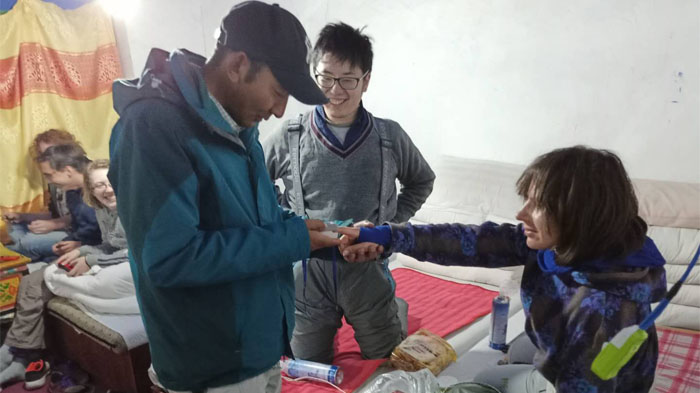
Our attentive Tibetan guide checks our client oxygen level with the pulse oximeter.
Besides the helicopter rescue, Sherpa can be hired in Nepal to guide climbers along the Southeast Ridge route, one climber or mountaineer can hire only one Sherpa. Being the major ethnic group native to the most mountainous regions of Nepal, Sherpa are highly regarded as elite mountaineers in their local area. One Sherpa can be an excellent guide and helper to external climbers.
6. Summit Night Duration
Northeast Ridge Route: Shorter
Southeast Ridge Route: Longer
7. Challenge Difficulty Level
Northeast Ridge Route: Harder
1. The altitude has always been the main cause of death on Northeast Ridge route. The Advanced Base Camp from which most mountaineers deem as the true beginning of the climbing has already been located at an incredibly high elevation of 6340 m (20800 ft.). Besides, altitude issues can be possibly caused by the long-time high-altitude mountaineering.
2. Crossing the more complicated Northeast Ridge which is located on the route from Camp 4 to the Second Step (One of the three prominent rocky steps on the northeast ridge of Mount Everest) requires not only excellent climbing techniques but also much more strength. To cross the ridge, every mountaineer should do a hard pulling on the fixed robe from the gully.
3. Climbing onto a rock slab with vertical ladders at the Second Step (8680 m) is also another challenge for mountaineers to conquer from the Northeast Ridge route.
4. Protruded huge loose rocks with a smooth surface and ice cracks are spread all along the route, accompanied by a steep slope of several hundred meters nearly 70 degrees. You need to care more about where to place your feet when you are moving forward.
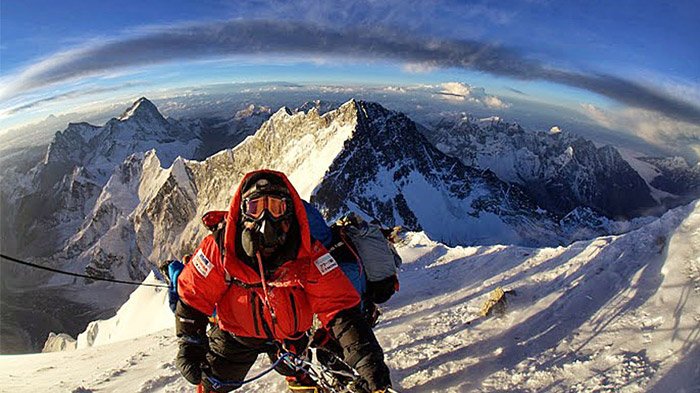
An expedition team was trying to summit Mt. Everest.
Southeast Ridge Route: Not as hard as from the Northeast Ridge Route
The Southeast Ridge route is widely acknowledged to be much easier to top the Everest. An authentic statistics show that the death toll of the Southeast Ridge route is far less than that of the Northeast Ridge one with factors most related to the altitude, fall, crevasse, and avalanche.
1. Like the Northeast Ridge route, longtime high-elevation mountaineering is much easier to cause altitude issues. So dying of altitude symptoms can also be the threat to those who choose the south side to top the summit.
2. Accidentally falling from the unstable areas can possibly happen along this route. However, the same situation is also faced in the Northeast Ridge route.
3. Here comes the most dangerous section of Southeast Ridge route - Khumbu Icefall, which is located on the way to the Base Camp 1 at the elevation about 6,000 m and it’s instable. The crisscrossed unfathomable ice crevasses spread widely along this area with potential dangers.
Meanwhile, the ice towers falling instantly from the Mountain also increases the probability of being hit when inching steps in this area.
Khumbu icefall should be the only major challenge that differs from the North Ridge route. But with adequate preparation, careful observation and moving, crossing this area can be much easier than climbing up the high altitude steep slopes and ascending the Three Steps in the Northeast Ridge route.
4. The South Slope seems to be more frequently stricken by the avalanche. The huge scale of an avalanche is more easily to be triggered by the earthquake, the icefall or any other interior movement of the Mountain.
5. More ridge slabs and more exposures
The mountain terrain of South Ridge route is also different with more ridge slabs. Crossing the Hillary Step which was the only way leading to the summit had imposed more exposure to this route in the past.
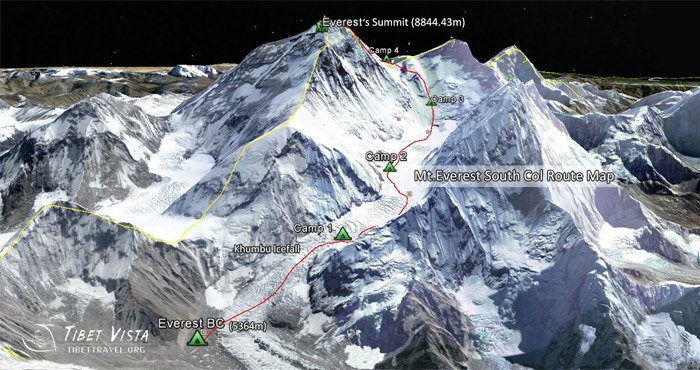 Climb Mt.Everest via South Col Route in Nepal
Climb Mt.Everest via South Col Route in Nepal
Now evidence has been found that this step has gone. No matter it is true or not, if you plan to top the Everest from this comparatively easier Southeast Ridge route, do prepare to handle with these ridge slabs and exposures since sometimes they are fatal.
Conclusion
Never to be too pessimistic about the conditions on either side of the Mountain. No matter in Nepal or in Tibet, each side has its own distinctive features that differentiate from one the other and imposes ecstasies for every visitor and climber to explore.
Due to the transitional locations, the climate of Mt. Everest in Tibet and Nepal varies all the time. At the same time, the characterized weather and climate of both sides creates the different Everest Base Camp tour. Pick up the one you favor most and neither of the routes will make you feel disappointed.
With the quite different climate, mountain terrains and the routes to the Everest summit, climbers and mountaineers must be prudent with their choices of topping the summit, for either route has its own lurking difficulties for everyone to challenge.
If you have any questions on the difference of the Mt. Everest in Nepal and Tibet, please don’t hesitate to send us a message or feel free to call.
More Mount Everest Base Camp Travel Guide
 Mt.Everest Fact
Mt.Everest Fact- Everest Base Camp Nepal vs Everest Base Camp Tibet
- Mount Everest History and Its Famous Explorers
- The Difference of Mt.Everest in Nepal and Tibet
- Kathmandu to EBC Distance: how far and how to get to EBC in Nepal and Tibet from Kathmandu
- How Many Base Camps on Everest in Both Sides of Tibet and Nepal
 Everest Base Camp Tour Guide
Everest Base Camp Tour Guide- When is the Best Time to Visit Tibet Everest Base Camp in 2024
- When is the Best Time to Enjoy EBC Trek in Nepal
- The Best Hotel at Everest Base Camp in Tibetan Side
- Guide to Tibet Everest Base Camp Tour in Winter
- How to Get to Everest Base Camp (EBC) from Nepal?
- How to Get to Mount Everest Base Camp from Lhasa
- What Documents Do I Need for Everest Base Camp Tour in Tibet and Nepal?
 Everest Trekking Guide
Everest Trekking Guide- What to Pack for Everest Base Camp Trek
- Tingri to Everest Base Camp Trekking
- Everest Trek: Trekking Routes along The Gama Valley
- Everest Base Camp Trekking Maps in Tibet
- Ultimate Packing List for Everest Base Camp Trek in Tibet
- Best Trek in Nepal: Everest Base Camp Trek vs. Annapurna Circuit Trek
- Top 2 EBC Trekking Routes in Tibet
- EBC Trek in Tibet vs. EBC Trek in Nepal

Recommended Everest Base Camp Tour Packages
-
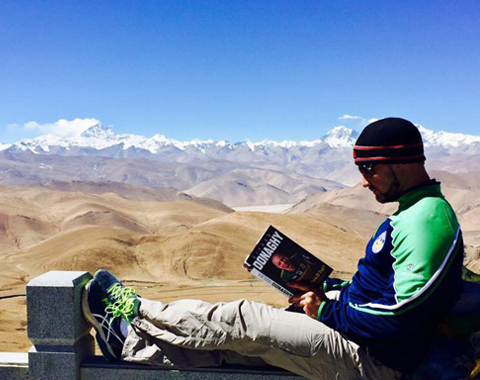 7 Days Lhasa to Kathmandu Overland Small Group Tour: Traverse from the North Side to the South Side of Mt.Everest for the Best of the Himalayas
7 Days Lhasa to Kathmandu Overland Small Group Tour: Traverse from the North Side to the South Side of Mt.Everest for the Best of the HimalayasTour Route: Lhasa - Gyantse - Shigatse - Everest Base Camp - Gyirong - Kathmandu
From USD979 p.p
-
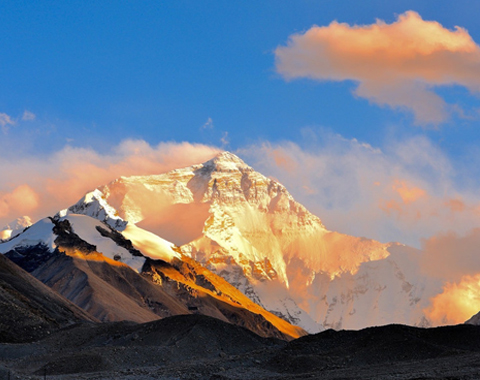 8 Days Lhasa to Everest Base Camp Small Group Tour: Marvel at Mt.Everest Real Close from 4 Different Viewing Platforms
8 Days Lhasa to Everest Base Camp Small Group Tour: Marvel at Mt.Everest Real Close from 4 Different Viewing PlatformsTour Route:Lhasa - Gyantse - Shigatse - Everest Base Camp - Shigatse - Lhasa
From USD939 p.p
-
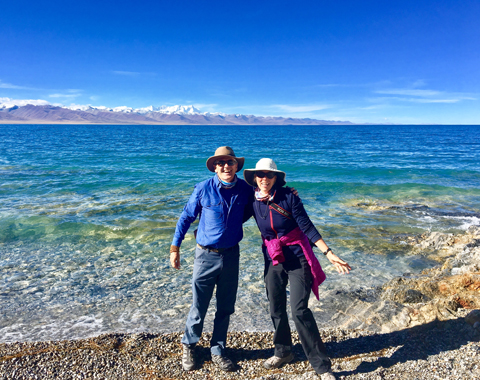 10 Days Lhasa to Everest Base Camp and Namtso Lake Small Group Tour
10 Days Lhasa to Everest Base Camp and Namtso Lake Small Group TourTour Route:Lhasa - Gyantse - Shigatse - EBC - Shigatse - Lhasa - Namtso Lake - Damxung - Lhasa
From USD1289 p.p
-
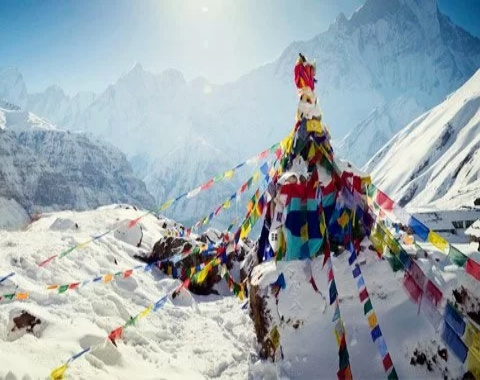 17 Days Nepal Everest Base Camp Trek Tour
17 Days Nepal Everest Base Camp Trek TourTour Route:Kathmandu - Phakding-Namche Bazaar-Tengboche- Dingboche- Lobuche-Gorakshep- Everest base camp-Kathmandu
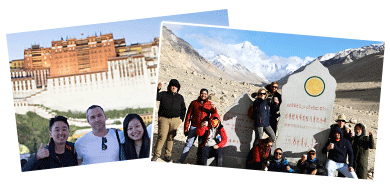

.jpg)


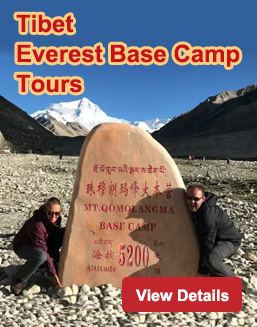

0 Comment ON "The Difference of Mt.Everest in Nepal and Tibet "